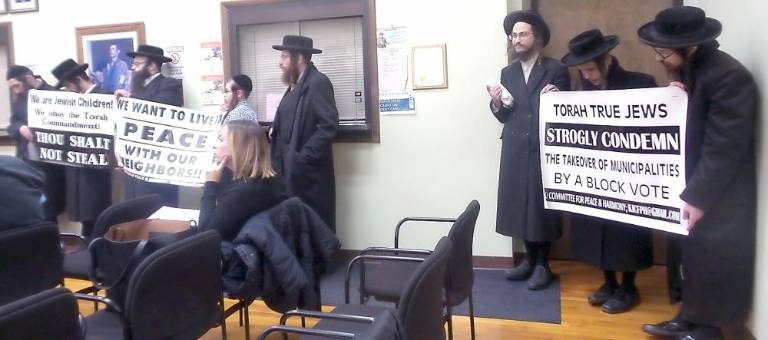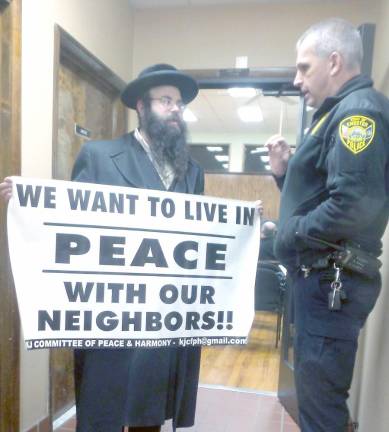Rabbis attend Chester meeting pleading for peace
Chester. A faction from nearby Kiryas Joel says they are good neighbors and disagree with their village's block vote.


A group of rabbis attended Chester's Dec. 11 town board meeting holding banners with a message of peace.
It was a day after a mass shooting in Jersey City, N.J., that included among its six fatalities two members of the Satmar Hasidic sect and a police officer. New Jersey's attorney general on Thursday called the shooting an act of domestic terrorism “fueled both by anti-Semitism and anti-law enforcement beliefs."
It was also a week after New York's attorney general accused the Town of Chester of a "blatantly anti-Semitic" campaign to deny housing to members of the Jewish community.
The rabbis who attended the Dec. 11 meeting were from KJ Community for Peace and Harmony, a dissident group from nearby Kiryas Joel, a village within the Town of Palm Tree. Most KJ residents are Yiddish-speaking Hasidic Jews who belong to the Satmar sect.
Their banners had these messages for the community:
"Torah true Jews strongly condemn the takeover of communities by a block vote"
"We want to live in peace with our neighbors!"
"We are Jewish children! We obey the Torah Commandment: Thou shalt not steal."
Sergeant David Slowik of the Town of Chester Police Department told Rabbi Yoel Loeb that a previous town administration had outlawed all banners in its public courtroom. Rabbi Loeb said he would happy to remove the banners if the board wanted him to.
He was not asked to remove the banners, as court was not in session.
Rabbi Loeb and his son, Rabbi Moshe Hersh, and other members of their group continued to hold the banners while standing against the wall in the meeting room.
Both Rabbi Loeb and Rabbi Hersh spoke during the public comment session. They said their goal was to live peacefully with their neighbors.
Rabbi Loeb said many KJ residents disagreed with the village's block vote "which takes away representation from the people who are not part of the bloc vote." He said KJ residents understand the dilemma bloc voting presents.
Rabbi Hersh spoke of the horror of the Jersey City tragedy. He said Jewish people were obligated by Jewish law to cultivate good relations with their neighbors to avoid tragedies.
Rabbi Loeb told The Chronicle that most of the men holding banners were not KJ residents but came from nearby communities in New York and New Jersey. He said he would like to make his group's peace and harmony into a worldwide movement.